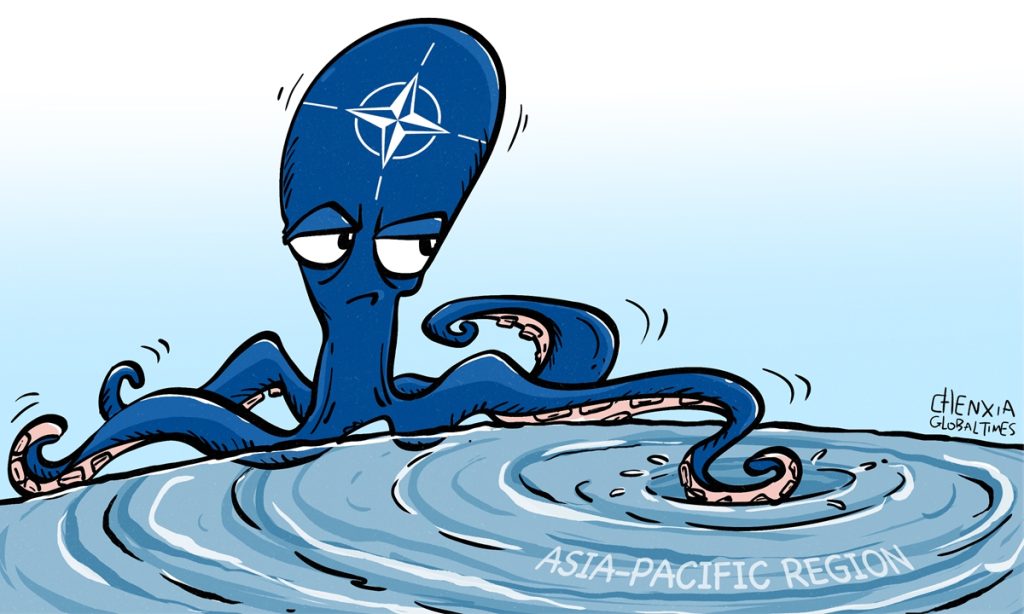China strongly condemns extremely irresponsible remarks of NATO chief: FM

China strongly condemns the extremely irresponsible and provocative remarks made by NATO Secretary General Jens Stoltenberg that were characterized by a Cold War mentality, blame shifting, and shirking responsibility on the Ukraine issue, Chinese Foreign Ministry spokesperson Lin Jian said on Friday.
On Thursday, Stoltenberg reiterated at the closing press conference of the NATO summit that NATO defines China as a "decisive enabler" of the Russia-Ukraine conflict, and claimed that China has adopted more aggressive actions in its Hong Kong Special Administrative Region and the South China Sea, Taiwan and neighboring countries, and is conducting a large-scale military build-up in a non-transparent fashion.
Lin noted that Stoltenberg's remarks were filled with ideological prejudice, reversing right and wrong, maliciously attacking China's political system, openly interfering in China's internal affairs, and maliciously distorting China's domestic and foreign policies.
Stoltenberg's remarks also shift blame and shirk responsibility on the Ukraine issue, misleading the international community's perception of China's normal military development and its relations with outside countries. China expresses strong dissatisfaction and firm opposition to this, said Lin.
Lin said that Stoltenberg has repeatedly ignored facts and China's repeated representations, using various occasions to smear and attack China, promoting the "China threat" narrative, and inciting anti-China sentiment. His intentions to cooperate with certain forces in suppressing and containing China has been fully exposed.
Such clumsy performances cannot help but arouse the world's vigilance and fully demonstrate that NATO, as a remnant of the Cold War and a product of bloc confrontation and group politics, only creates risks and challenges to world peace and stability, Lin said.
Lin said that certain Western politicians, who are nearing the end of their political careers, should not to attempt to leave a legacy through fanning the flames, provoking trouble, and shifting blame onto others.
China will firmly follow the path of peaceful development, injecting stability and positive energy into world peace and stability through its own development and international cooperation. At the same time, it will firmly safeguard its own sovereignty, development, and security interests. Viewing China as an "imaginary enemy" will ultimately lead NATO to reap what it has sown, Lin noted.
China on Thursday also voiced strong opposition and lodged stern representations on Thursday with NATO after it issued a direct warning to China for the first time regarding the so-called support to Russia in the Ukraine crisis.
Leaders of NATO's 32 members held a three-day summit in Washington, DC from Tuesday to Thursday. And for the third year in a row, the leaders of New Zealand, Japan and South Korea attended the summit as observers.
According to reports, Japanese Prime Minister Fumio Kishida held talks with South Korean President Yoon Suk-yeol on Wednesday, and both sides expressed hope that Japan and South Korea can maintain close cooperation with NATO.
Lin said at the Friday press conference that NATO, led by the US, as a remnant of the Cold War and the world's largest military alliance, claims to be a regional and defensive organization while continuously creating regional tensions and promoting bloc confrontation. It seeks excuses to strengthen its ties with countries in the Asia-Pacific region, which has aroused high vigilance among regional countries.
The Northeast Asia region, having suffered from the ravages of war, military standoff, and bloc confrontation, deeply understands the value of peaceful coexistence, solidarity, cooperation, and mutual benefit. The current state of peace, cooperation, stability, and prosperity in the Asia-Pacific region, including Northeast Asia, is the result of the joint efforts of regional countries, said Lin.
The Asia-Pacific does not need military alliances, nor does it need "small circles" that provoke great power confrontation and instigate a new Cold War, said the spokesperson.
We hope that regional countries will adhere to the path of Asia-Pacific cooperation, play a constructive role in maintaining and promoting peace, stability, and development in the region and the world, and refrain from acting as the vanguard for NATO's expansion to Asia-Pacific, Lin said.